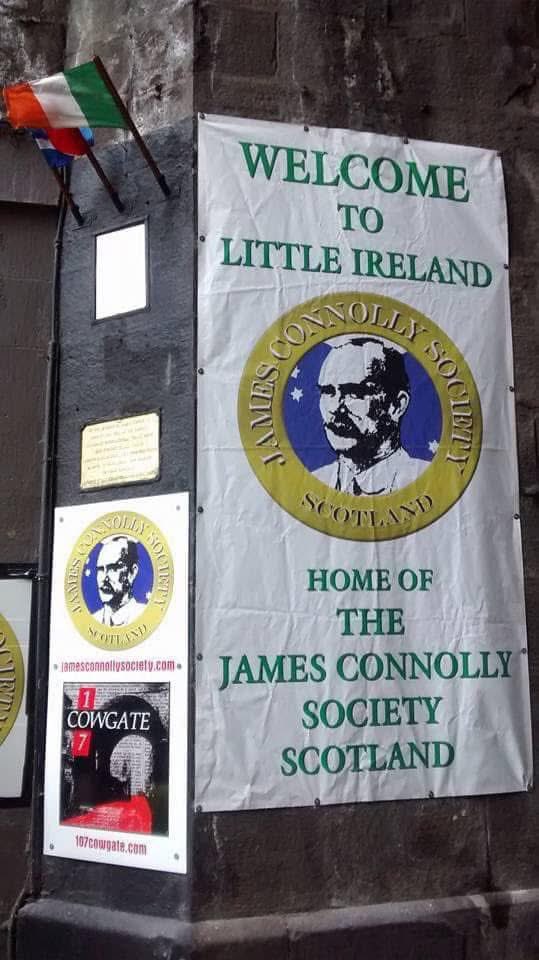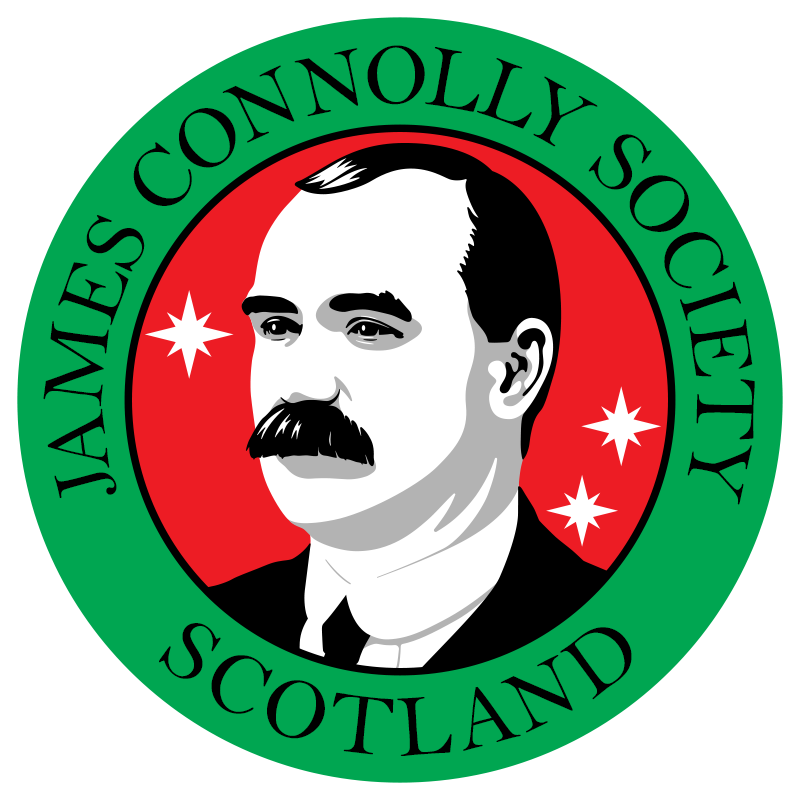Reading Connolly In The Waste Land
Tomorrow, June 5th, is James Connolly’s birthday. As in previous years we will gather at his birthplace, 107 Cowgate, to celebrate his life. This year is the 39th annual James Connolly commemoration in his home city of Edinburgh. Much has changed since the first commemoration in 1986, of course. But the James Connolly Society continues to organise around Connolly’s life and work.
Since the beginning, the Connolly commemorations have tried to do two things simultaneously. Firstly, we exist to celebrate James Connolly. Focusing on his life, not his death, and in doing so we focus on his whole life. Secondly, we aim, as a working-class organisation, to advance the politics of working-class emancipation. This dual focus, on the past and the present, while trying to propel our politics forward, to the future, is tricky!
This year’s commemoration line-up perfectly blends the different aspects of our work and our approach. A key feature of JCS activity throughout the years has been international solidarity. So this year the main speaker, Hussein Ezzedine, Scottish Palestine Solidarity Campaign Trade Union Officer, will address the situation in Palestine directly. We have also consistently given a platform to current community or workers’ struggles nearer to home. This year Danny Taylor, a striking Birmingham bin worker, will address the rally on their long running and ongoing industrial dispute.
With these two struggles, one international and the other industrial, we see James Connolly’s politics as the link.
In the late 80’s and early 1990’s I used to give talks on Connolly and the JCS, which included references to aspects of the political and economic situation that Connolly would recognise. This focused on the balance of forces facing working class activists, the legacy of British imperialism at home and abroad, such as the war in Ireland, that unfinished revolution that had led to the British state executing James Connolly, the impacts of Thatcherism, and neoliberalism more broadly, in attacking social safety nets and returning us to Victorian style housing crisis, which Connolly had campaigned on as a young activist in Edinburgh, and emergence on this side of the channel of the sort of rampant individualism which Connolly had disliked during his time in the United States.
During Connolly’s life as an activist there was a genuine belief in the possibility of fundamental change for working-class people and even the power of revolution. The formation of trade unions, of political parties, of workers organisations. Organisation which set out to radically alter or upend the established political and economic order. Although it is hard to believe now, and I have trouble convincing myself never mind younger people, the 1980’s was a period when it was still possible to hear echoes of that belief. That confidence in class politics and revolutionary action. Huge industrial conflicts between the State and working class people, such as the Miner’s Strike, or movements like the ANC in South Africa, or PLO in Palestine, or the Sandinistas in Nicaragua, seemed to be about the continuation of age-old struggles or, perhaps, even prefiguring a better future. An era of endings for sure. But endings with at least the possibility- or even, say it softly, hope-of new beginnings.

We now live in an era of world history that is very different from the 1980’s. In 1913 James Connolly wrote “We fight as conditions dictate; we meet new conditions with new policies. Those who choose may keep old policies to meet new conditions. We cannot and will not try.” Similarly, the JCS have changed over the years. Meeting new conditions with new policies. Such transitions are never easy. Recognising mistakes, failures and blind alleys, never is. But it is essential.
Writing in 1951, the poet Stephen Spender said “From 1931 in common with many other people, I felt hounded by external events.” 1931 was the year the Labour government collapsed, the Great Depression seemed to be never-ending and bank collapses spread to Europe. It was the beginning of a decade that would see hunger marches at home and war against Fascism in Spain. For Spender and his generation of artists engaged in left wing activism, the ‘external events’ hounding them was the rise of Fascism and Nazism and the feeling that another world war was inevitable.
I think about that line of Spender’s a lot. Are we not ‘hounded by external events’ today? Is it possible to think about domestic politics without thinking of Gaza? Of Trump? Of Putin? Of Starmer’s Churchill act? One feature of political life in the thirties was the sense that public events were intruding on private events. That is to say that global politics were intruding on domestic politics. That the noise of history was drowning out all other sounds. It is also to say there was a recognition that economic woes were not temporary. But indicative of something more fundamental and long lasting. Of decay, even collapse, of the system. In much the same way I think it is useful to think of our current political and economic conjuncture not as a bump in the road but a turn off road. Despite Labour’s claims that ‘the adults are back in charge’. This is not a blip. There will be no return to normal. There is no normal.
In that context the rise of Reform is a harbinger. Potentially of something much worse. We might see it as the presence of history. Of history becoming a lived part of our present or future. One of the key cultural reference points in the thirties was T.S. Eliot’s 1922 poem The Waste Land. A fragmented poem about a fragmented society. For Eliot modernity and societal change, even developments such as technology, had collapsed the existing order of things but not improved people’s lives. Instead, it had created a wasteland.

We don’t have to go too far from the cosmopolitan core of Edinburgh, or many other cities, to find our own twenty-first-century wasteland. Attacks on working class people’s conditions in workplaces and communities. Large swathes of the city abandoned to anti-working class elements, like drug gangs and charities. A political class obsessed with growth while increasingly citizens lives are characterised by human isolation, frustration and despair. To live in our wasteland is to live amidst the ruins. The decay goes far beyond the physical infrastructure. The crises are multiplying, the problems are obvious, the suffering clear, but where are the organisations? They are dead or dying, broken or weakened, incompetent or corrupt. We live in an era of endings. But endings without new beginnings.
What political form and direction will the current crisis take? All of the above, along with that lingering eighties hangover of selfishness and the ‘greed is good’ ethos, are the perfect recruiting grounds for Fascism. For people angry and ignored and condemned to the margins of our cities in every sense. People looking for quick solutions and for someone to lead in a leaderless time. The far-right are seeking to fill a vacuum the political class created. Only the working class can stop them.
One of the tragedies of the Easter Rising, and the executions that followed, is that we never got to know Connolly’s views on the Russian Revolution, or the Soviet Union, or Fascism, or Nazis, (or T.S. Eliot for that matter) or so much else. James Connolly cannot give us answers to present questions. His writings are not roadmaps that we can pull off the shelf and use to guide us through our current political problems. They cannot be lifted out of their time and place. Neither are they sacred texts to be dusted down and quoted as political self-justification.
What we can and must do is learn to think like Connolly. To view the world as Connolly viewed the world. One of the many remarkable things about James Connolly was his ability to think outwith parameters which were set for him and his class. He could assess the political landscape, understand what needed to be done and articulate solutions which broke moulds. For us to create new working class institutions, to defend our areas from attacks from the political class, to defeat the far-right, and to build working class power, we must think and act outwith the parameters the State sets. In this Waste Land we must return to Connolly.
The 2025 James Connolly Commemoration is open to all.
Gather at Connolly’s plaque in Cowgate at 6.30pm.
Speakers, live music and wreath laying ceremony.
Hosted by the James Connolly Society and organised in conjunction with Connolly’s home community.
You can follow Jim Slaven on Substack here: https://substack.com/@jimslaven

5 June – James Connolly’s birthday – is a key date in my communist calendar and I’ve been honoured to take part in many of the celebrations of Edinburgh’s finest citizen and Hibs supporter #1 in the Cowgate and beyond.
This year I sadly can’t be there as I’m giving a lesson in how to best use your voice in street agitation meetings for Palestine activists in Glasgow. I can’t think of a better way to celebrate Connolly with this and I’ve been looking through Conor McCabe’s first volume of Connolly’s Lost and Early Writings for inspiration ( and expiration of breath! ). The fact that comrades are again taking to the streets in struggles of international solidarity are certainly an inspiration and never more vital.
I salute all the stalwart work of Jim Slaven and the James Connolly Society and will hail happy birthday to James Connolly tomorrow.
Why not mention that the poet Stephen Spender and much of the European ‘non-communist Left’ was funded by the USAmerican CIA?
The CIA’s Cultural War: how the CIA secretly funded the magazine Encounter:
https://www.bbc.co.uk/programmes/p037t501
The Cult of the Artist is just another manifestation of the right-wing ‘Great Man (Occasionally Woman) View of History’. Why should political figures be fêted as celebrities by the Left?
Not many fitba teams can lay claim to having a world famous revolutionary Marxist, anti-imperialist fighter as one of their founding supporters, though Hibs can in the shape of James Connolly, another one of those juicy tidbits we Hibees like to mention now and again (first British team in Europe, first team with floodlights, etc etc), yet further confirmation that Hibernian are the thinking-man/woman’s team, and always have been and probably always will be…
Pitching in TS Eliot is a bit of a surprising choice given how reactionary he was; remember, the Wasteland is all about the end of classical, elite culture and, with the rising tide of popular, mass politics, what Eliot saw as the end of a whole civilization, mortally under threat from the “hollow men”…
As it turned, out, popular culture has given us so much more than TS Eliot could have ever dreamed of…. (though he would probably disagree)…
@Douglas, in Who Paid the Piper? The CIA and the Cultural Cold War, Frances Stonor Saunders writes about the elite (Eliot, Auden, Tate, Lowell) that awarded Bollingen Prize to antisemite Ezra Pound, p250 “in a hospital for the criminally insane, the only American charged with treason in the Second World War” to public controversy. Poets, eh?
There are probably more interesting football examples in Soccer vs the State, by Gabriel Kuhn. Hibernian isn’t in the listed clubs (congratulations on winning the league, by the way).